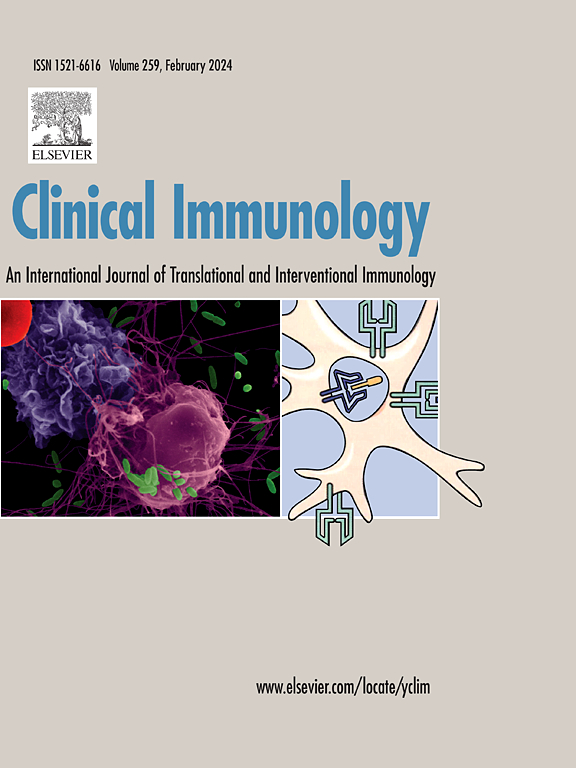Association of mucosal neutrophil inflammation and cytokine responses with natural and experimental pneumococcal carriage in a randomised vaccine trial using experimental human pneumococcal carriage
IF 3.8
3区 医学
Q2 IMMUNOLOGY
引用次数: 0
Abstract
Background
Mucosal inflammation is associated with increased nasal pneumococcal colonisation, but the specific mechanisms are not fully understood. We aimed to find innate immune factors associated with pneumococcal carriage using a controlled human infection model.
Methods
Healthy Malawian adults participating in a randomised trial of pneumococcal conjugate vaccine (PCV13) were inoculated with one of three doses of Streptococcus pneumoniae 6B. We categorised the participants into 4 pneumococcal carriage outcome groups - no carriage; natural carriage; experimental carriage; and dual carriage. We then measured neutrophil to lymphocyte ratio (NLR) in nasal mucosa and cytokine levels in nasal lining fluid at 7 days before and 2, 7 and 14 days after inoculation.
Findings
We found that 45 % of participants had no carriage, 35 % had natural carriage, 12 % experimental carriage and 8 % dual carriage. At 2- and 7-days post inoculation, all groups showed an increase in NLR compared to 7 days before inoculation, accompanied by small changes in cytokine levels. An early increase in NLR was associated with protection against experimental carriage while cytokines did not associate with carriage pattern.
Conclusion
Nasal inoculation with S. pneumoniae 6B induced mild, mucosal inflammation but established carriage was not pro-inflammatory. This suggests that nasal inoculation as a vaccine strategy could be asymptomatic.
在一项使用实验性人肺炎球菌携带的随机疫苗试验中,粘膜中性粒细胞炎症和细胞因子反应与自然和实验性肺炎球菌携带的关联
背景:粘膜炎症与鼻腔肺炎球菌定植增加有关,但具体机制尚不完全清楚。我们的目的是通过控制人类感染模型来寻找与肺炎球菌携带相关的先天免疫因子。方法:参加肺炎球菌结合疫苗(PCV13)随机试验的健康马拉维成年人接种了三剂肺炎链球菌6B中的一剂。我们将参与者分为4个肺炎球菌携带结果组:无携带;仅限自然运输;实验运输;还有双车厢。然后在接种前7 天和接种后2、7和14 天测量鼻黏膜中性粒细胞与淋巴细胞的比率(NLR)和鼻衬液中细胞因子的水平。结果:我们发现45 %的参与者没有携带,35 %的参与者有自然携带,12 %的参与者只有实验携带,8 %的参与者有双重携带。在接种后2天和7天,与接种前7 天相比,所有组的NLR都有所增加,并伴有细胞因子水平的微小变化。早期NLR的增加与实验性运输的保护有关,而细胞因子与运输模式无关。结论:鼻腔接种肺炎链球菌6B可引起轻度黏膜炎症,但已建立的载体不具有促炎作用。这表明鼻接种作为一种疫苗策略可能是无症状的。
本文章由计算机程序翻译,如有差异,请以英文原文为准。
求助全文
约1分钟内获得全文
求助全文
来源期刊

Clinical immunology
医学-免疫学
CiteScore
12.30
自引率
1.20%
发文量
212
审稿时长
34 days
期刊介绍:
Clinical Immunology publishes original research delving into the molecular and cellular foundations of immunological diseases. Additionally, the journal includes reviews covering timely subjects in basic immunology, along with case reports and letters to the editor.
 求助内容:
求助内容: 应助结果提醒方式:
应助结果提醒方式:


